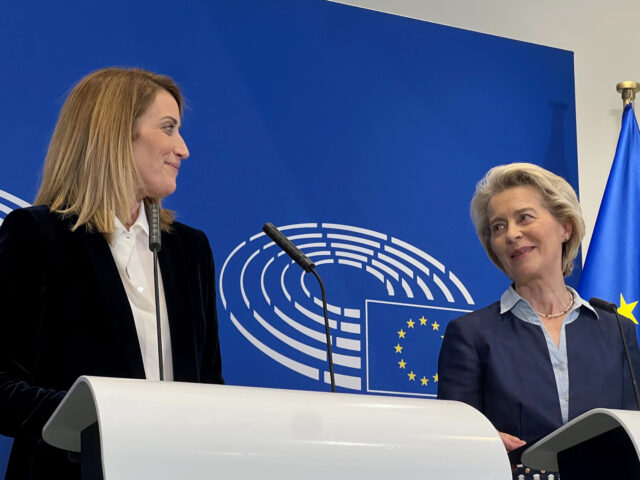The European Parliament narrowly passed a controversial set of immigration reforms on Wednesday afternoon as centrist globalist parties prevailed over objections from both the left and the right.
After briefly being interrupted by leftist protesters claiming the New Pact on Migration and Asylum would “kill” and overriding growing objections over the Brussels power grab from the populist right, the European Parliament approved the contentious measures by an average of 300 votes in favour to 270 against during a series of votes on Wednesday afternoon in Strasbourg, Euronews reports.
The reforms, which have been in the works since the eruption of the European Migrant Crisis now nearly a decade ago, come amid increasing illegal immigration, with 380,000 migrants illegally entering the bloc last year, the highest figure since 2016.
Hailing the passage of the New Pact, European Parliament President Roberta Metsola said: “History made. We have delivered a robust legislative framework on how to deal with migration and asylum in the EU… It has been more than ten years in the making. But we kept our word. A balance between solidarity and responsibility. This is the European way.”
‼️ Protests erupted earlier in the European Parliament as lawmakers started to vote on the controversial Asylum and Migration Pact.#MigrationPact #EU pic.twitter.com/DtvquUQmit
— Brussels Signal (@brusselssignal) April 10, 2024
The main thrust of the legislation, which is expected to come into full force within two years, will be to create a system of “mandatory solidarity” in which all 27 member states, regardless of their size or nationally approved policies, take in illegal migrants who enter into the bloc.
The measure, intended to alleviate the pressure on Southern European nations, notably Italy, Greece, and Spain, who receive the main brunt of illegal migration coordinated by people-smuggling gangs — often facilitated in part by left-wing ‘rescue’ NGOs — operating on both sides of the Mediterranean.
To enforce the system of “solidarity”, Brussels will hand out fines of up to 20,000 euros against member states for every illegal migrant they refuse to take in. This policy has been described by conservative nations such as Hungary as a direct assault on their national sovereignty, given the great pains taken by Budapest to prevent illegal migration at its own borders.
Hungarian leader Viktor Orbán previously claimed the move represented a desire from Brussels to “force the migrant compact down our throat” before the European Parliament in June, during which anti-mass migration nationalist-populist parties are expected to make big gains, which could have prevented the New Pact from being passed.
Orbán, who is seeking to lead the charge in reshaping the EU to having a more limited role in the internal affairs of member states, said that Brussels should instead focus its efforts on border enforcement and prevention, rather than on distributing illegals throughout the bloc.
The New Pact on immigration instead focuses on enhanced screening of alleged asylum seekers, allowing for the collection of fingerprints for any migrant over the age of six years old as well as pre-entry collection of information such as age, nationality and face scans. There will also be updates to the Eurodac database to crack down on migrants launching multiple asylum claims.
Hungary’s Orbán Declares Migrant Violence Has ‘Crossed the Rubicon’, EU Immigration Pact Has Failed https://t.co/rCphzWnekA
— Breitbart London (@BreitbartLondon) September 29, 2023
In terms of prevention, rather than turning illegals back at the borders of Europe, the bloc will rely on third-party nations such as Egypt and Tunisia to crack down on people smugglers operating within their borders in the hopes that EU trade dollars will incentivise cooperation from the Cairo and Tunis.
Additionally, the New Pact will amend the Asylum Procedures Regulation (APR) to include a fast-tracked option for asylum requests capped at three months to apply to migrants who represent a threat to national security, lie on their asylum requests, or who came from countries with low-recognition rates such as Morocco, Pakistan, and India. Such migrants will not be allowed to freely reside within any European nation during their application, but rather be forced to stay at border facilities to create a “legal fiction of non-entry.”
Whether this will assist in the EU successfully deporting more illegals remains to be seen, given the bloc’s low success rate in convincing native countries to accept back their countrymen, with just 28,900 of the 105,00 non-EU citizens ordered to leave the bloc last year being successfully returned to their homelands.
The approval of the New Pact comes amid increasing anger throughout Europe against the globalist migration policies of Brussels, with a survey conducted by Euronews of 26,000 people across 18 member states finding that 51 per cent of respondents have a negative view of the EU’s immigration policies, compared to just 16 per cent positive.
The survey also found that 71 per cent of the European public believes that strengthening the borders should be the primary focus of immigration policies, signalling a potential boon to anti-mass migration parties ahead of the European Parliament elections in two months.
‘Sharp Turn to the Right’ — Populist Parties Projected to Win EU Parliament Elections in Nine Nations https://t.co/55dYsysrZw
— Breitbart London (@BreitbartLondon) January 27, 2024

COMMENTS
Please let us know if you're having issues with commenting.